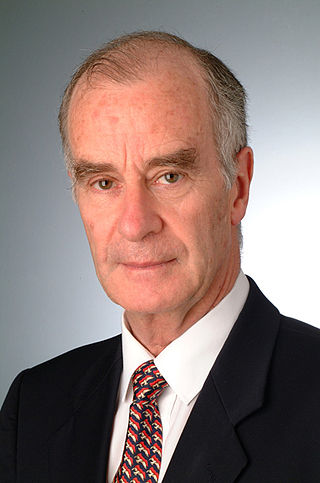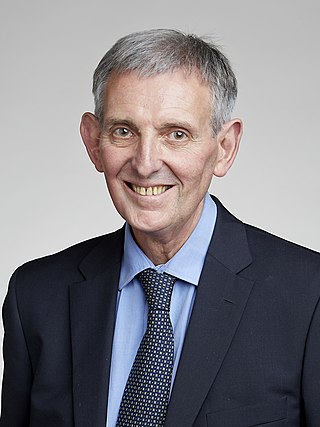
Neurology is the branch of medicine dealing with the diagnosis and treatment of all categories of conditions and disease involving the nervous system, which comprises the brain, the spinal cord and the peripheral nerves. Neurological practice relies heavily on the field of neuroscience, the scientific study of the nervous system.

Eva Lucille Feldman is an American physician-scientist who is a leading authority on neurodegenerative disease. She serves as the Russell N. DeJong Professor of Neurology at the University of Michigan, as well as Director of the NeuroNetwork for Emerging Therapies and ALS Center of Excellence at Michigan Medicine. She was also named the James W. Albers Distinguished University Professor of Neurology.
Sifap is a Pan-European study dedicated to investigating the correlation of juvenile stroke and a genetic disorder known as Fabry's disease. It was initiated by University of Rostock, Germany. In recruiting 5,000 patients aged 18 to 55 it will be the largest study on stroke in the young. Approximately 50 study centres from about 15 European countries are participating in the project. The study is divided into two parts: sifap1 and sifap2. Whereas sifap1 analyses the frequency of Fabry disease within the patient cohort, sifap2 controls and investigates the rehabilitation phase of diagnosed Fabry patients.
Steven T. DeKosky is the Aerts-Cosper Professor of Alzheimer's Research at the University of Florida (UF) College of Medicine, deputy director of UF’s Evelyn F. and William L. McKnight Brain Institute (MBI) and associate director of the 1Florida Alzheimer’s Disease Research Center.
John Quinn Trojanowski was an American academic research neuroscientist specializing in neurodegeneration. He and his partner, Virginia Man-Yee Lee, MBA, Ph.D., are noted for identifying the roles of three proteins in neurodegenerative diseases: tau in Alzheimer's disease, alpha-synuclein in Parkinson's disease, and TDP-43 in Amyotrophic Lateral Sclerosis (ALS) and frontotemporal degeneration.
Aaron E. Miller is an American neurologist, the first Chairman of the Multiple Sclerosis section of the American Academy of Neurology (AAN) and recognized as a multiple sclerosis clinician.
Fred D. Lublin is an American neurologist and an authority on the treatment of multiple sclerosis. Along with colleagues at the National Multiple Sclerosis Society, his work redefined the clinical course definitions of MS.
Richard T. Johnson was a physician and scientist at the Johns Hopkins University School of Medicine. Johnson was a faculty member in the Department of Neurology since its inception in 1969 and was the former head of the department. His research into the effects of viruses on the central nervous system has been published in over 300 scientific articles, and Johnson was both a journal and book editor and the author of an influential textbook, Viral Infections of the Nervous System.
Avindra "Avi" Nath, is a physician-scientist who specializes in neuroimmunology. Nath is a senior investigator, and intramural clinical director of the National Institute of Neurological Disorders and Stroke (NINDS) at the National Institutes of Health (NIH) in the United States. At NINDS, Nath also leads the Section of Infections of the Nervous System and plans to institute a translational research center. He previously served in several research and administrative positions at the Johns Hopkins Hospital and the Johns Hopkins University School of Medicine.

Wolf-Dieter Heiss is an Austrian neuroscientist, director of the department of neurology, University of Cologne and of department of general neurology at the Max-Planck-Institute for Neurological Research, Cologne (Germany).
Gregor Karl Wenning is a German neurologist best known for his clinical and scientific work in Parkinson's disease and atypical Parkinsonian disorders, particularly multiple system atrophy (MSA). In 2006 he was appointed Professor and Head of the Division of Clinical Neurobiology at the Medical University Innsbruck.

The European Academy of Neurology (EAN) is a non-profit organisation that unites and supports neurologists across Europe. Currently, 47 European national neurological societies as well as 4000 individuals are registered members of EAN. Thus, EAN represents more than 45,000 European neurologists.

Thomas John "Jock" Murray is a Canadian neurologist, medical historian and author.
Cerebrolysin is a mixture of enzymatically treated peptides derived from pig brain whose constituents can include brain-derived neurotrophic factor (BDNF), glial cell line-derived neurotrophic factor (GDNF), nerve growth factor (NGF), and ciliary neurotrophic factor (CNTF).

Vladimir Hachinski is a Canadian clinical neuroscientist and researcher based at the Schulich School of Medicine and Dentistry at Western University. He is also a Senior Scientist at London's Robarts Research Institute. His research pertains in the greatest part to stroke and dementia, the interactions between them and their joint prevention through holistic brain health promotion. He and John W. Norris established the world's first successful acute stroke unit at Sunnybrook Hospital in Toronto, and helped make stroke units the standard of care for stroke patients everywhere. He discovered that the control of the heart by the brain is asymmetric, the fight/flight (sympathetic) response being controlled by the right hemisphere and the rest and digest (parasympathetic) response being controlled by the left hemisphere and damage to one key component can lead to heart irregularities and sudden death. This discovery has added fundamental knowledge to how the brain controls the heart and blood pressure and lays the foundation for helping prevent sudden death.

David Alastair Standish Compston is a British neurologist. He is an emeritus professor of neurology in the Department of Clinical Neurosciences at the University of Cambridge and an emeritus fellow of Jesus College, Cambridge.
Madakasira Vasantha Padma Srivastava is an Indian neurologist, medical academic and writer, and the professor of neurology at the All India Institute of Medical Sciences, New Delhi. She is known for pioneering Acute Stroke Programme (Code-Red), a medical initiative for supporting patients afflicted with epilepsy and stroke, incorporating Hyperacute Reperfusion strategies including the thrombolysis program. The Government of India awarded her the fourth highest civilian honour of the Padma Shri, in 2016, for her contributions to medical science.
Joanna Marguerite Wardlaw is a Scottish physician, radiologist, and academic specialising in neuroradiology and pathophysiology. Wardlaw worked as a junior doctor before specialising as a radiologist. She continues to practice medicine as an Honorary Consultant Neuroradiologist with NHS Lothian. She has spent her entire academic career at the University of Edinburgh.
Pasquale Calabrese born 27 February 1961 in Naples, Italy, is an Italian professor of clinical neurosciences at the University of Basel, Faculty of Psychology, Department of Molecular and Cognitive Neurosciences. He is a neuroscientist, experimental neurologist and medical neuropsychologist.
Michael Brainin is an Austrian neurologist and emeritus professor at the Danube University Krems. He is widely known as a pioneer in stroke research and prevention as well as a leading figure in the development of stroke units. Brainin was president of the Austrian Stroke Society, the European Stroke Organisation and the World Stroke Organization.






